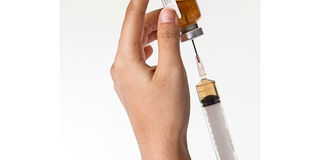TB vaccine lowers blood sugar in diabetics

The study also raised the possibility that BCG vaccines could be beneficial against type 2 diabetes. PHOTO| FOTOSEARCH
The tuberculosis vaccine improves blood sugar levels for type 1 diabetes patients.
Three years after receiving two doses of the BCG vaccine, normally used to prevent tuberculosis, members of a group of adults with longstanding type 1 diabetes showed a dramatic improvement in average blood sugar levels that persisted for five years.
Initial clinical trial results, published in a 2012 PLOS One paper, reported that two doses of BCG spaced four weeks apart led to reductions in autoreactive T cells, an increase in cells that prevent autoimmune reaction and what turned out to be a transient increase in insulin production. But by the end of that 20-week trial, there was no reduction in HbA1c, the established measure of blood sugar levels over time.
The current results are based on data from 282 participants and 230 who contributed blood samples for mechanistic studies.
Regular monitoring found that the HbA1c levels of those who received BCG had dropped by more than 10 per cent at three years after treatment and by more than 18 per cent at four years.
That reduction was maintained over the next four years, with treated participants having an average HbA1c of 6.65, close to the 6.5 considered the threshold for diabetes diagnosis, and with no reports of severe hypoglycaemia.
Participants in the placebo group and in a comparison group of patients receiving no treatment experienced consistent HbA1c elevations over the same eight-year period.
The research team identified a mechanism not previously seen in humans in response to treatment with any drug—a shifting of the process of glucose metabolism from oxidative phosphorylation, the most common pathway by which cells convert glucose into energy, to aerobic glycolysis, a process that involves significantly greater glucose consumption by cells.
The researchers also found that BCG could reduce blood sugar elevations that were caused by means other than autoimmune attack, raising the possibility that BCG vaccines could also be beneficial against type 2 diabetes.
“In addition to the clinical outcomes, we now have a clear understanding of the mechanisms through which limited BCG vaccine doses can make permanent, beneficial changes to the immune system and lower blood sugars in type 1 diabetes,” wrote the researchers.
Used for almost a century to prevent tuberculosis, BCG has been known for more than 30 years to boost production of a cytokine called tumour necrosis factor (TNF), which may be beneficial in autoimmune diseases, both by eliminating the autoreactive T cells that attack an individual’s tissues — pancreatic islets in the case of type 1 diabetes — and by inducing production of regulatory T cells (Tregs) that could prevent an autoimmune reaction.
The research team’s findings set the stage for further studies of BCG administration, including the FDA-approved phase 2 study currently underway, testing multiple BCG doses in a large group of participants with longstanding type 1 diabetes.



